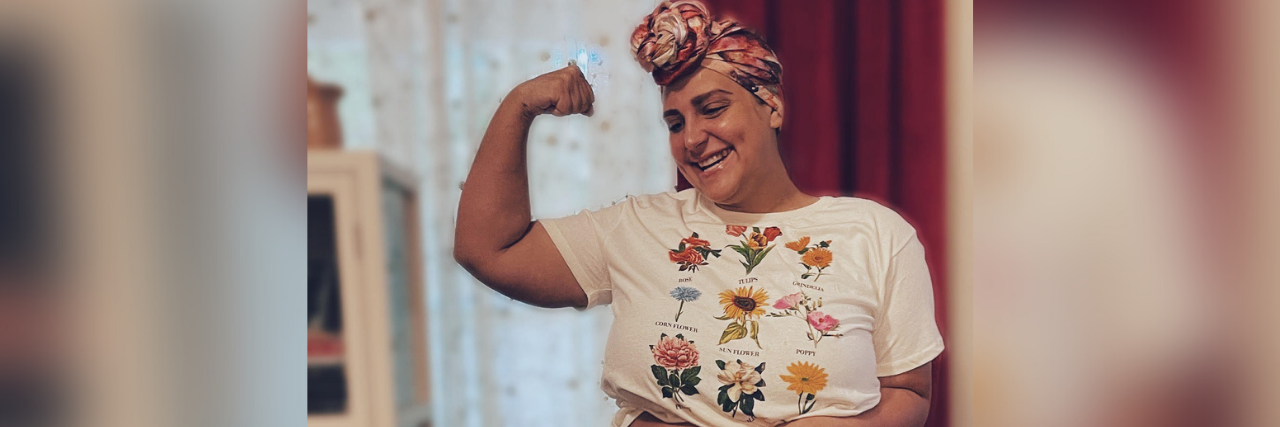This past December, I had our sixth miscarriage. I’ve had a dozen procedures and scans, spent years on steroids, hormones, had a handful of laparoscopic procedures and scrapings and a partial hysterectomy. My organs are painfully fused and bound together in my pelvis via scar tissue and adhesions within my bowel due to my deeply infiltrating endometriosis. Frozen pelvis, constant bladder pain, spasms and urgency, sharp nerve pain in my back to my rectum to the underbelly of my abdomen making it painful to walk, sit or lie down. The constant abdominal pressure and bloating… it’s misery. Yet, to my friends, family and beyond — I am the super mom and wife.
Having an invisible and chronic illness is complete and utter exhaustion, and not just because of the illness itself. With an invisible illness, no one can physically see your pain or ailments. We may seem perfectly physically healthy on the outside. So, when our moods, attitudes, tolerances or abilities don’t match that physical facade, presumptive stereotypes are made by those around us.
Trying to exist in the workplace, classroom or at family or social outings with chronic and debilitating pain, and maintaining a happy, charismatic demeanor is exhausting. There are times I just could not fake it or put on a front through the pain a moment longer. My quietness, lack of interest or engagement has been perceived as rude or having a negative attitude. In times when I made the decision to disclose my illness, it was assumed I must have a low pain tolerance, because I seemingly looked fine. The joke has been made I am a hypochondriac by those who can’t seem to grasp why I am always not feeling well. My tiredness or fluctuations in weight have been perceived as laziness or a poor diet instead of the reality: vicious side effects of steroids and hormone therapy.
If you relate above, you may feel my pain of living with an invisible illness and trying to figure out the right balance of managing your illness and relationships. You may try to hide your illness, and go on as if you aren’t in pain. But, it’s inevitable. You’ll start missing too many days of work or call off plans with friends, and you owe an explanation. You try to disclose, but maybe when you do, you aren’t taken seriously. You’re misunderstood. You begin to spiral into this dark pit of despair, and let the stereotypes pressed against those of us with invisible illnesses seep in.
Am I actually sick? Maybe I’m not.
Are those adhesions and cysts real?
What if it’s really not that bad?
What if I do have a low pain threshold?
What if I am a hypochondriac?
You seek validation. You desperately seek explanations for your pain that are tangible pieces of evidence to prove to yourself or those around you that you do, in fact, have valid reasons for being tired all the time. You feel the need to explain yourself to avoid an awkward conversation or confrontation down the road where the inevitable comments about your lack of enthusiasm or participation are made. You avoid picking up your medications at the pharmacy, because you physically look and seem well, and the pharmacy tech has given you condescending looks or made comments about your pain prescription that left you feeling embarrassed.
Your bank teller asked you for supporting documentation when depositing a short-term disability check, but didn’t ask your husband when he deposited it on your behalf. When you asked why, she stumbled on her words as you told her legally you don’t need to disclose your medical condition to validate a check. You cry in your car, because although you don’t look sick, you couldn’t feel worse.
You disclose to someone you love, you feel like you need to go to the hospital and they say, “you look fine.” It’s exhausting in every capacity imaginable — emotionally, mentally, physically. I was so tired of seeking validation, avoiding conversations and situations, I woke up one day and said, “I don’t want to be invisible anymore.”
Although, I 100% support the right of anyone to make the choice to disclose or not disclose their illness, I decided to start sharing my journey. I won zero trophies for spending a decade and a half putting on a front, trying to conceal my pain, going on as if all is fine. I thought I was toughing it out. I realize now that was not bravery. Bravery (to me) is sharing my story, my illness, the intimate details of my anatomy and feeling as if I have set myself free. The amount of effort that goes into trying to protect or validate your illness is immense.
Making my invisible illness, visible, has improved my life and relationships in immeasurable ways. If I disclose my illness, and I still experience negative scenarios and responses like those above— I no longer sit quietly. I’m too busy fighting chronic pain to fight for someone to believe, validate or support me. In unmasking my illness, I found strength, glory and empowerment. I’m learning to see my scars are warrior wounds, and love my signature endo belly. Although fear of judgment or fear of losing out on opportunities still looms, I know I have gained far more by now making myself and my illness visible.
Original photo by author

